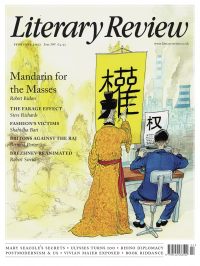Patrick Graney
True Colours
Phenotypes
By Paulo Scott (Translated from Portuguese by Daniel Hahn)
And Other Stories 240pp £10
The fact that the title of Paulo Scott’s 2019 novel Marrom e Amarelo (‘Brown and Yellow’) has been translated as Phenotypes shows the difficulty of communicating Brazil’s complex racial politics to Anglophone readers. Scott’s principled but troubled narrator, Federico, who is light-skinned, participates in a government commission on racial quotas at universities. He is forced to abandon his role, however, when a revolver he hid many years ago with his brother Lourenço, who is dark-skinned, becomes a central part of a case involving Lourenço’s daughter, who has been caught up in student protests.
At the heart of Phenotypes is the relationship between racial self-identification and the labels assigned to us. In obsessively detailed and sometimes exhausting prose, Scott deftly conveys Federico’s anxieties in this regard: Federico’s mixed parentage and his upbringing in a predominantly black neighbourhood are juxtaposed with his pale skin, such that he questions the authenticity of his dedication to fighting racial injustice. Scott is particularly sharp when describing the rambling debates within the commission, leaving the reader with the impression that, in Brazil, people of colour are pawns in a heartless system that favours the semblance of justice over justice itself.

Sign Up to our newsletter
Receive free articles, highlights from the archive, news, details of prizes, and much more.@Lit_Review
Follow Literary Review on Twitter
Twitter Feed
The era of dollar dominance might be coming to an end. But if not the dollar, which currency will be the backbone of the global economic system?
@HowardJDavies weighs up the alternatives.
Howard Davies - Greenbacks Down, First Editions Up
Howard Davies: Greenbacks Down, First Editions Up - Our Dollar, Your Problem: An Insider’s View of Seven Turbulent...
literaryreview.co.uk
Johannes Gutenberg cut corners at every turn when putting together his bible. How, then, did his creation achieve such renown?
@JosephHone_ investigates.
Joseph Hone - Start the Presses!
Joseph Hone: Start the Presses! - Johannes Gutenberg: A Biography in Books by Eric Marshall White
literaryreview.co.uk
Convinced of her own brilliance, Gertrude Stein wished to be ‘as popular as Gilbert and Sullivan’ and laboured tirelessly to ensure that her celebrity would outlive her.
@sophieolive examines the real Stein.
Sophie Oliver - The Once & Future Genius
Sophie Oliver: The Once & Future Genius - Gertrude Stein: An Afterlife by Francesca Wade
literaryreview.co.uk